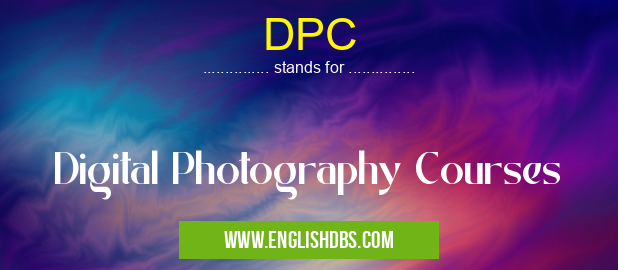What does DPC mean in PHOTOGRAPHY & IMAGING
Digital Photography Courses (DPC) are comprehensive educational programs designed to enhance the skills and knowledge of photographers, whether they are beginners or experienced professionals. These courses typically encompass a wide range of topics related to digital photography, from camera techniques and composition to image editing and post-processing.

DPC meaning in Photography & Imaging in Miscellaneous
DPC mostly used in an acronym Photography & Imaging in Category Miscellaneous that means Digital Photography Courses
Shorthand: DPC,
Full Form: Digital Photography Courses
For more information of "Digital Photography Courses", see the section below.
What does DPC Stand For?
DPC stands for Digital Photography Courses. It refers to structured learning programs that provide comprehensive instruction in the field of digital photography.
Key Focus Areas of DPC
DPC programs typically cover the following key focus areas:
- Camera Techniques: Participants learn about camera functions, settings, and operation, as well as how to capture high-quality images in various lighting conditions.
- Composition and Visual Storytelling: DPC courses emphasize the principles of composition, including elements such as lighting, framing, and perspective, to help photographers create compelling and visually engaging images.
- Image Editing and Post-Processing: Participants gain proficiency in using industry-standard software such as Adobe Photoshop and Lightroom to enhance and manipulate their images, adjusting exposure, color balance, and other parameters.
- Professional Practices: DPC programs may also cover business-related topics, such as marketing, pricing, and copyright, to prepare photographers for professional work.
Benefits of DPC
Enrolling in a DPC program offers numerous benefits to aspiring and practicing photographers:
- Enhanced Technical Skills: DPC courses provide a structured learning environment where participants can develop their technical proficiency in digital photography.
- Improved Composition and Storytelling: By understanding the principles of composition, photographers can create visually stunning images that effectively convey their intended message.
- Proficient Image Editing: DPC programs equip photographers with the knowledge and skills to enhance and manipulate their images using industry-standard software.
- Professional Development: DPC courses may include business-related topics that prepare participants for professional work in the field of photography.
- Networking Opportunities: DPC programs often provide opportunities for participants to connect with other photographers, share ideas, and build relationships within the industry.
Essential Questions and Answers on Digital Photography Courses in "MISCELLANEOUS»PHOTOGRAPHY"
What is DPC?
DPC stands for Digital Photography Courses. These courses provide comprehensive instruction on various aspects of digital photography, including camera techniques, composition, editing, and post-processing.
Why should I take a DPC?
DPCs are beneficial for individuals who want to improve their photography skills, learn new techniques, and gain a deeper understanding of the art form. They can also help individuals prepare for a career in photography.
What are the different types of DPCs?
DPCs vary in terms of their focus and level of instruction. Some common types include:
- Beginner courses: These courses provide a foundational understanding of digital photography.
- Intermediate courses: These courses build upon basic principles and introduce more advanced techniques.
- Advanced courses: These courses cover specialized topics and provide mentorship for experienced photographers.
What do I need to know before enrolling in a DPC?
Most DPCs have no prerequisites, but some may require basic knowledge of photography or related software. It's important to check the course requirements before enrolling.
How long do DPCs typically last?
The duration of DPCs varies depending on the course level and instructor. Beginner courses may last a few weeks, while advanced courses can span several months or even years.
What equipment do I need for a DPC?
Most DPCs require students to have access to a digital camera. Some courses may also recommend additional equipment such as lenses, tripods, or editing software.
How much do DPCs typically cost?
The cost of DPCs varies depending on the course provider, location, and level of instruction. Some courses may be offered for free, while others can cost several thousand dollars.
What are the benefits of taking a DPC?
Taking a DPC can provide numerous benefits, including:
- Improved photography skills
- Increased knowledge and confidence
- Career advancement opportunities
- Creative fulfillment
Final Words: Digital Photography Courses (DPC) are invaluable educational programs that offer a comprehensive approach to learning the art and science of digital photography. By providing instruction in camera techniques, composition, image editing, and professional practices, DPC programs empower photographers to enhance their skills, create stunning images, and pursue professional opportunities in this rapidly evolving field.
DPC also stands for: |
|
| All stands for DPC |
